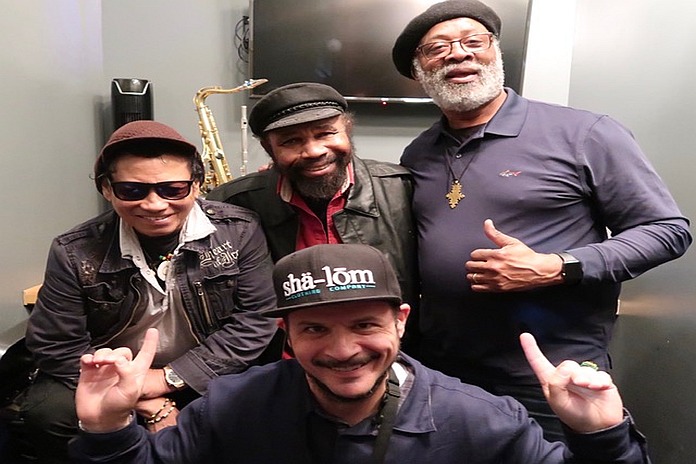By Stephen Cooper
On February 26, before coronavirus disrupted normal rhythms of life all over the world, I spoke for twenty minutes with my friend, legendary guitarist Tony Chin, at the Dub Club in Los Angeles; only a few hours later, in a spirited, sizzling performance, Tony would headline a memorable show there with fellow legendary members of the Soul Syndicate—the top studio band in Jamaica during the 1970s—bassist George “Fully” Fullwood, and drummer Carlton “Santa” Davis. What follows is a transcript of our discussion, modified only slightly for clarity and space considerations.
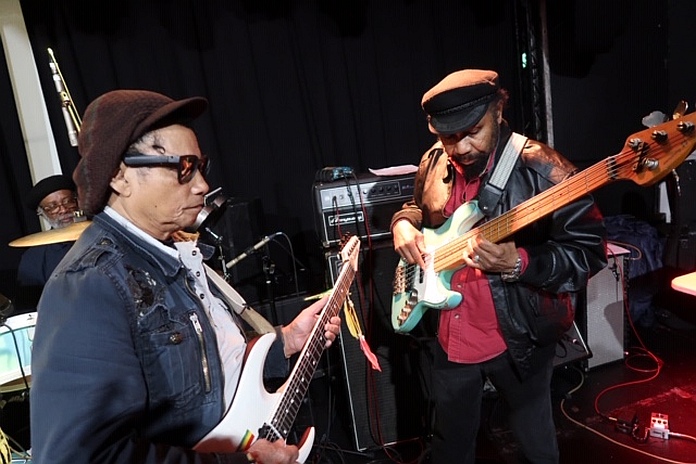
Q: Thanks for talking with me briefly, Tony, before headlining [here] tonight at the Dub Club. Now Santa just released—on the first of this month—an incredibly cool solo album, “Africa Is My Home.”
Tony Chin: Uh-huh, you know I haven’t heard it yet?
Q: You haven’t? Oh man, [it’s] a great album!
Tony Chin: Yeah mon.
Q: I know also, you [too] are going to be releasing, any moment now, [a solo] album [called] “Unstoppable.”
Tony Chin: [I’m going to release] two albums soon.
Q: Two [albums]?
Tony Chin: Yeah, “Unstoppable,” original music, and then, “Jamaican Classics: Chapter Two.” I have [an album already released called] “Jamaican Classics: Chapter One,” with rocksteady music. [So] I did a part two. And this one is even better than the first one.
Q: So that’s the second album that’s coming out. But let me go back for a second [to] “Unstoppable,” [the] fourteen-track album that you let me listen to a copy [of], that has the single you’ve [already] released, “Watch Out Fi Dis.” When is the rest of the album coming out? Will it be coming out this month?
Tony Chin: It’ll be coming out between March and April. [The album] is finished. The engineer[, Raymond Valles,] is coming to the Dub Club tonight; [he] is bringing me the master [recording] so I can listen to it—[and] agree that everything is okay [with it]. If it were [solely] up to me, the album would [have] been [released] a few months ago, but the engineer keeps mixing it. [Anyway,] I’m gonna get the master [recording] tonight [from him], and when I listen to it and give the go-ahead, we’re gonna send it to press.
Q: Cool. [Reggae fans] will look out for that, and also now, on our radar, will be this [another album], “Jamaican Classics: Chapter Two.” When I interviewed you for the first time, you gave me a copy of “Jamaican Classics: Chapter One,” and I told you how much I enjoyed it—
Tony Chin: Yes!
Q: —man, because you really [nicely] re-[booted] some of the old [classics]—
Tony Chin: Yeah!
Q: Who are some of the [veteran artists that you cover] on [Chapter] Two?
Tony Chin: Alton Ellis, Paragons, Melodians, [and more], you know?
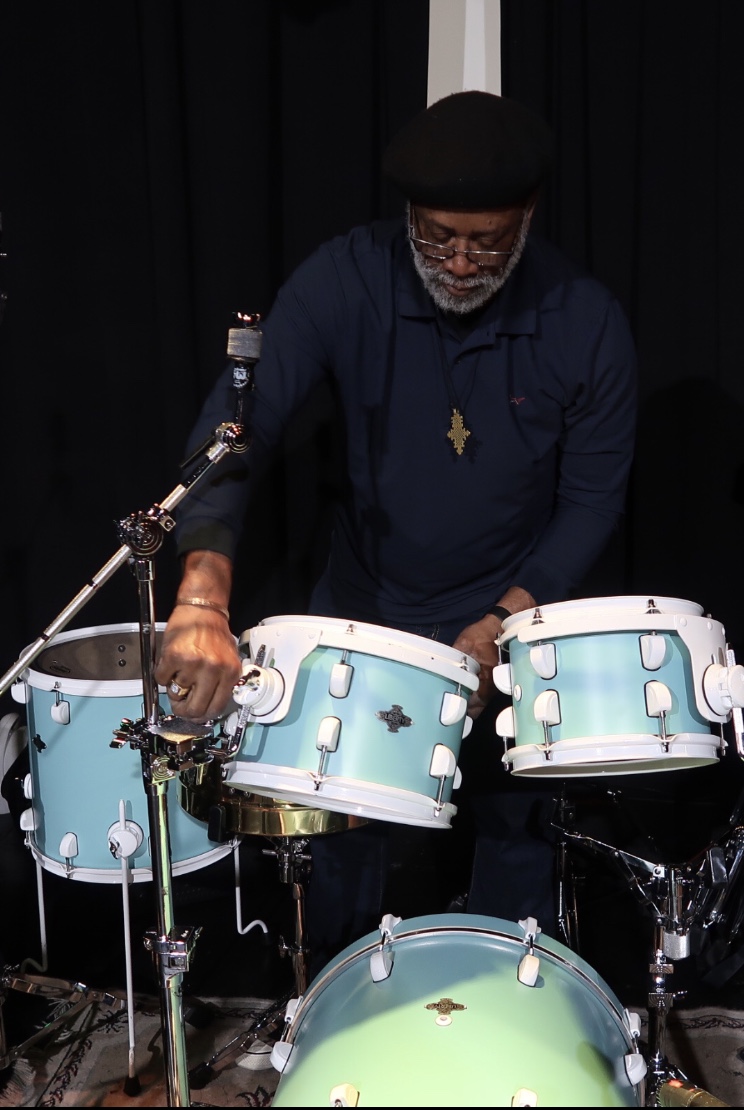
Q: Now [since] you’re gonna release these [two] albums, and Santa has released [a new album]—I haven’t gotten a chance to ask Fully [Fullwood] yet if maybe he’ll be releasing [a solo] album himself—but, will the Soul Syndicate, here you guys are tonight headlining at the Dub Club in Los Angeles, will you guys [be releasing] a new album together [as] the Soul Syndicate?
Tony Chin: You know two years ago, [legendary guitarist Earl] “Chinna” [Smith] was here [in California] and we recorded a Soul Syndicate album.
Q: You did!?
Tony Chin: Yeah. And this guy named “Bushman,” he’s the one that paid [all the expenses to make the album]. And he has it, [and] he hasn’t released the album.
Q: Why not?
Tony Chin: I have no idea. We can’t find him.
Q: You don’t know where he is?
Tony Chin: No.
Q: “Bushman?”
Tony Chin: Bushman.
Q: What is his whole [legal] name?
Tony Chin: I don’t know (laughing).
Q: (Laughing) You don’t know? So he might be in the bush somewhere?
Tony Chin: (Laughing) The bottom line is we did a Soul Syndicate album.
Q: There’s a whole album somewhere—
Tony Chin: Yes!
Q: —and [Bushman] has the master [recording], and you don’t know where he is? That must be so frustrating!?
Tony Chin: That was about two or three years ago. He flew up Chinna [from Jamaica], Keith Sterling—
Q: This guy “Bushman” did that?
Tony Chin: Yes.
Q: And now he’s gone, [he’s] in the wind?
Tony Chin: We talked to him a few times last year. Fully went to his mother’s funeral. And after [that], we can’t find him now; he’s a recluse.
Q: So when I ask [if Soul Syndicate is going to record a new album], you’re too frustrated about what happened last time—
Tony Chin: —[to even think about] a next album, right.
Q: Could it be possible though, if another investor came through—
Tony Chin: Well yeah, if there’s an investor.
Q: Well I hope [another investor] will approach you guys, and make a good offer to you guys [to do that]. [Now] the Soul Syndicate has been playing together so long, [and] history is going to record that you guys were the top studio band [in Jamaica] in the 70s; you backed so many [legendary] artists [on so many hit songs. Nevertheless, how do you [personally] want the Soul Syndicate to be remembered in reggae music?
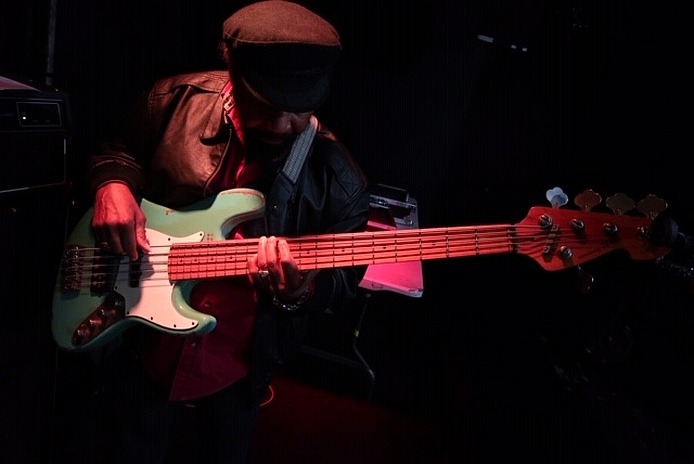
Tony Chin: Well…. We are icons. We did so many songs—I’m listening to songs [we did] and I don’t remember them. The songs I remember most are the ones that hit. So the Syndicate members dem, dem are all icons. Because when Fully, Chinna, Santa, me, and Keith Sterling [are] together in the studio, it’s like magic. [So,] we’re icons. And they call us “legendary.”
Q: How do you want people to remember your music?
Tony Chin: Just…. Just like how they remember Bob Marley’s kinda music. It’ll live forever. It’s forever, because[, for example], one of the biggest songs we did, you know, was “[Sister Nancy’s] “Bam Bam”; a song written by Ansell Collins, that was one of the biggest dancehall hits [ever]. So a lot of people, the youths dem nowadays, [they] hear that song and they don’t know who played [on it,] because they weren’t even born yet when those songs [were] record[ed].
Q: Selecta Jerry, a [respected] radio DJ in Princeton, New Jersey, [and host of the very popular show “Sounds of the Caribbean”] asked, because [the Soul Syndicate] has been [playing] together for so long[, approximately fifty years now]: Was there ever a time in your history as a band where, because some [member of the band] was experimenting with the sound, or doing something different with the sound, that [caused] a riff or discord between the band members in the Soul Syndicate?
Tony Chin: Yeah mon, listen, we’re not perfect. Every [music] group has likkle fights here and there—you know, friendly fights and different opinions—yeah mon, we all go through that. As an example, we recorded a song for a producer named “Niney the Observer” [called] “Blood and Fire.” That was the first song we recorded for Niney. Now when we go in the studio, we had [some] discord because Niney told me he don’t want to hear the regular “skank-skank-skank.” Reggae skank. He don’t want that. So there was a discord right there. So I say: “Sho, what am I gonna do?” But then I got an idea and came up with a different kinda riddim. And that song hit – one of the best riddims I ever played on a reggae song.
Q: I [remember you telling me when I first interviewed you] that you weren’t sure you could ever [play that same riddim exactly like that again]?
Tony Chin: Yeah, the vibes at that moment, the magic, maybe that riddim wouldn’t fit in any other song, but as I say: Music is magic. That song, that riddim, it kinda fit that vibe.
Q: For sure; I love that song.
Tony Chin: Yeah mon. So that’s how that idea came up, you know, [Niney] said he didn’t want that regular skank riddim—he wanted something different; he [didn’t] know what he want[ed].
Q: So sometimes when you have a disagreement like that, [or discord,] that can benefit the music because you can come up with—
Tony Chin: Yeah, yeah mon.
Q: —because it forces you to [work] outside the box—
Tony Chin: Ah, there you go! Everything out of di box! Yeah, mon.
Q: What advice would you give to other bands—whether in reggae or any genre—[on how] to stay together making meaningful music for as long as the Soul Syndicate has? Even if you guys aren’t always putting out [new] albums still, for example, tonight, three of the founding members have come together [again to perform]. You guys have been friends making meaningful music together for about fifty years—
Tony Chin: Yeah mon.
Q: So what is your advice to other bands on how to stay [friends,] and stay together. Because, just, for example, one of the bands that I really loved when I first started to cover [and write extensively] about reggae music was Raging Fyah. I loved Raging Fyah.
Tony Chin: Yeah, yeah, I love that band too.
Q: But then they broke up. The lead singer, Kumar Fyah Bent, went solo. Raging Fyah the band is still together, but they have a different configuration [now]. [So,] they’re still a band, but it’s not the original [composition]. How does [the Soul Syndicate] stay together [as long as you have] as a band?
Tony Chin: You see, in the music, it’s very hard because, you know, sometimes finances cause things fi broke up, and sometimes, ego. In the band, the musicians dem are all good, but then the ego [of one or more individual band members] takes over sometimes.
Q: Because the Soul Syndicate is mostly an instrumental band, you guys are not [in the first instance] singers—though on your solo albums you do sing[, and sing exceptionally]—but your history was as a backing band—
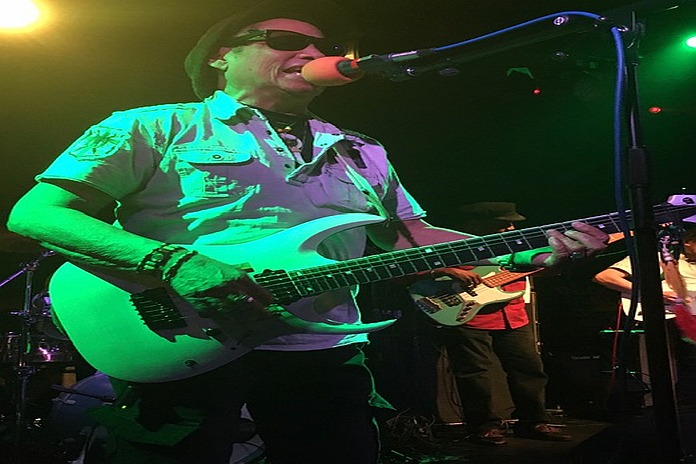
Tony Chin: Soul Syndicate was a backing band. And a studio band. It’s not like we are Steel Pulse or Third World, and just go out on our own and stuff.
Q: Only now, as you guys have gotten older, have you released solo albums?
Tony Chin: Yes. Well, Soul Syndicate has two [solo] albums out [too,] you know? Harvest Uptown was [our] the first album, and Was, Is & Always [was the second]. Those two albums we went on our own with Warren Smith on the label.
Q: Those albums are awesome; where you guys are singing and playing all of the instruments. But I guess the reason I asked [the question] like that is because [it seems the inclination of the members of the Soul Syndicate] is first as musicians. And [so it seems] easier [perhaps] to stick together. Because if you have a singer, like with Bob Marley and the Wailers, there [seems] like there’s naturally going to be a bit of an ego thing when you have a singer—
Tony Chin: Okay, even when Soul Syndicate was formed, and we [were] a studio band, a backing band, we had singers, [too]. We had lead singers. We’d have—Dennis Brown was [one of our] lead singer[s]. For maybe two years. Freddie McGregor was [once] our lead singer.
Q: I think you told me that! [Both of them were, at one time, the] lead singer of the Soul Syndicate!
Tony Chin: Yeah mon. They didn’t come on[stage] as Dennis Brown or Freddie McGregor, but as lead singer for the Soul Syndicate.
Q: I don’t think a lot of people know that.
Tony Chin: Yes. We’d have lead singers. Because we used to play concerts and state shows.
Q: So let me ask you this, because [recently I was watching the 1980 documentary made about the Soul Syndicate that’s available on YouTube, called] “Word, Sound and Power.” Do you still have your guitar that you played [on] in that documentary? It’s got Rasta colors, it’s the coolest guitar—
Tony Chin: I gave [it] to my cousin. And he can’t find it now.
Q: Aw, man.
Tony Chin: I’m sorry I gave it away.
Q: Also [depicted] in [“Word, Sound and Power”] there are these young women who are dancing in the movie; I think [they were called] the “Soul Syndicate Fan Club.” Can you explain a little bit what that was?
Tony Chin: The Soul Syndicate Fan Club would go around [Jamaica] and dance, and win contests. Now [there were] two girls [who were part of the fan club]—they are twins—that’s Fully [Fullwood]’s nieces; Fully’s brother’s daughters. They would dance and win contests.
Q: Awesome. Now Tony, this is a little bit off of topic, but I still want to ask it [anyway]. Reggae star Cocoa Tea wrote a popular song about Barack Obama, though he has since told me in an interview that he regrets it. He sang it around the time of the elections—
Tony Chin: Did you [ever] hear my Barack Obama song (“God Bless America w/Barack Obama”)?
Q: (Laughing) No! You have one?
Tony Chin: (Laughing) What di heck!? Boy—
Q: I’ve never heard your Barack Obama song.
Tony Chin: I’ve gotta to send it to you; it’s on YouTube. When he won the presidency, I got inspired, and I wrote it.
Q: You have to send it to me. I didn’t know you had one, [too]. But do you know the song I am talking about [by] Cocoa Tea?
Tony Chin: Yeah, I know the one.
Q: So Cocoa Tea wrote that, and he told me that, ultimately, he regrets it. Because he kinda felt let down by Obama, because Obama didn’t end the wars. And Cocoa Tea said he felt Obama should have done more to end the wars [the U.S. was embroiled in]. So [ultimately] he regretted writing that song. But do you think reggae artists should speak out about U.S. politics and political candidates in their music, and also when they’re at a show or on stage if they have the chance, and the platform[, should they do so then also]? And does [the answer to that] depend on whether they live in the United States—like you, and Fully, and Santa do—or not?
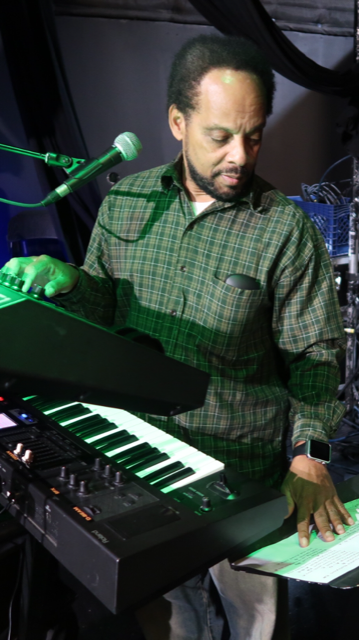
Tony Chin: Well you don’t have to talk about just U.S. politics, politics is all over the world. What reggae artists should do [and sing about] is politics in the world all over.
Q: Fair enough. [But] I’m not gonna let you escape [the question] like that—that’s too easy. Because I agree with you. Politics has always been, from Bob Marley to Burning Spear, politics has always been a theme [in reggae music]. So the reason why I’m asking is because [the political situation] in the U.S. is starting to heat up. [And so,] should reggae stars, in today’s era, should they, and do they have an obligation to, in their music, and whenever they have a chance to when they are on stage, talking to a crowd or whatever, should they inject—
Tony Chin: Yeah mon, they should inject politics in the music. But onstage, in a concert, they can’t all the time bring that up. But in the music they’re recording, they gotta inject what’s going on.
Q: Do they have a moral duty to do that?
Tony Chin: Yeah mon. Because in reggae we are singing about what is going on in life.
Q: About truth and rights?
Tony Chin: Yeah, and [about] equal rights.
Q: So relatedly, I’m gonna ask: Do reggae artists have an obligation and a moral duty to speak out against [President] Donald Trump specifically—to try and prevent his re-election?
Tony Chin: In the music, not onstage.
Q: That’s interesting, they don’t want to hear you—
Tony Chin: Because the people that come to concerts, they don’t want to hear you preach; they want to hear di music. You know I wrote a song about Donald Trump? It’s called “President Tweet.” I’ll send it to you.
About the Author: Stephen Cooper is a former D.C. public defender who worked as an assistant federal public defender in Alabama between 2012 and 2015. He has contributed to numerous magazines and newspapers in the United States and overseas. He writes full-time and lives in Woodland Hills, California. Follow him on Twitter at @SteveCooperEsq



